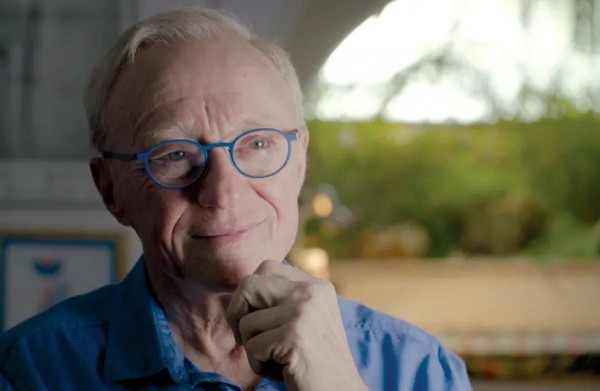-
GROSSMAN (Adi Arbel 2021)
ADI ARBl: GROSSMAN (2021)

A prominent Israeli writer's life reviewed
The well-known Israeli writer David Grossman, now 68, is the star of this short documentary film about himself by filmmaker Adi Abel. Grossman is the author of See Under Love (1989), about the Holocaust, whose composition is described here. His 1991 A Book of Intimate Grammar is about a boy age age 11-15 growing up in a poor part of Jerusalem. A 1994 change of pace, a much more lighthearted coming of age tale, was Grossman's The Zigzag Kid, which won prizes in Italy. His fame spread when his 2017 novel about a repellant standup comic A Horse Walks Into a Bar won the International Man Booker prize, along with his frequent English translator, Jessica Cohen; in 2018 he received Israel's highest literary award. Another notable Grossman novel, Falling Out of Time, (2014) was a response to the death of his son Uri while serving in the Israeli military. There are a dozen fiction books in all, and five works of nonfiction. Four Israeli film adaptations have been made from Grossman novels. The method of this film is straightforward, with archival footage and plenty of narration drawn from multiple interviews with the author in which he talks about his life and work.
Grossman is first introduced when he recently met with a group of his translators in Croatia. His work has been translated into more than 40 languages. Addressing the camera later, he tells how as a child, not an ordinary boy (what writer is?), he was already a compulsive, fluent spinner of tales, and in recognition of this, once his teacher set him down in the schoolyard and said, "Tell a story." His parents and grandparents were of humble working class status. His father was a bus driver but later a librarian who brought him home books, including the stories of Sholom Aleichem, which he devoured. He developed a connection with Israeli radio early, going there even as a boy to act in plays, and later he got a regular job there. His army service was with intelligence, involving listening from high places. It was then that he met Michal, his wife of fifty years, whom we see then and hear from now. Grossman talks about how his obsessive work when writing must be difficult for family, since he describes it as like an illness that possesses him.
In the middle of the film's 54 minutes he talks about the occupied territories and himself, and he is glimpsed frequently visiting them, using his knowledge of Arabic to talk to Palestinians. His book The Yellow Wind (1987) was the result. Its pro-Palestinian views caused about 98% of the staff of the state radio to turn against him and for him to be fired from the Voice of Israel where he had worked for many years. He says he thinks this situation, the injustice of the status of Palestinians, can't continue. But it seems that an Israeli to go on living as he has, to be the writer he has been, he has generally had to set this issue to one side.
Grossman's two sons served in the military, as Israeli citizens usually must. He wrote a 2008 novel To the End of the Land about how Israeli parents suffer when their children are serving. We see footage of both sons, Yonatan and the younger, Uri, even a stunningly intelligent dialog with them as young children when they ask him searching philosophical questions. When Yonatan returns from military service, Uri signs up for a tank unit, where he dies, in 2006, in a fierce battle with forces of Hezbollah.
Grossman tells us the story of the writer, David Grossman, here. But the part of this film that is affecting for anybody, and not only for fans or those curious about his books, is how keenly it makes us feel the loss of his younger son and how that connects, even if not specifically mentioned, with the ongoing hostilities between Israel and the Palestinians. It is not that Grossman doesn't go deep about anything here. He talks about "touching life and death at the same time" and that as something he felt in talking to his sons that he continually seeks now when he writes. He speaks of his soul disintegrating when he writes. He is known for dealing with profound matters in his books and he doesn't shirk them here. What Adi Arbel achieves is a film where Grossman continually seems to be talking directly to us.
But an interview with the filmmaker published in The Jerusalem Post shows Grossman, the famous, multiple award winning author, has long been hard for journalists or interviewers to get hold of and had to be handled with kid gloves here. A certain element of blandness of this after all in some ways not-very-deep film biography is shown by how little it says about his politics. After all, according to the Wikipedia article about Grossman, "he has been described by The Economist as epitomizing Israel's left-leaning cultural elite." Well, what of that? In contrast to documentary filmmakers who make themselves the star, she says in the interview, she stays out of the picture. And that can be appreciated. But maybe she should have dared to intervene more.
Grossman, 54 mins., debuted at Docaviv documentary festival in Tel Aviv Jul. 2, 2021, and in Jun. 2022 at Biografilm festival in Italy. Screened for this review as part of the July 2022 San Francisco Jewish Film Festival.
SFJFF SHOWTIMES:
JFI Digital Screening Room
Monday, Aug 1, 2022 12:01 AM - Sunday, Aug 7, 2022 11:59 PM
Last edited by Chris Knipp; 07-23-2022 at 08:49 AM.
 Posting Permissions
Posting Permissions
- You may not post new threads
- You may not post replies
- You may not post attachments
- You may not edit your posts
-
Forum Rules





 Reply With Quote
Reply With Quote
Bookmarks